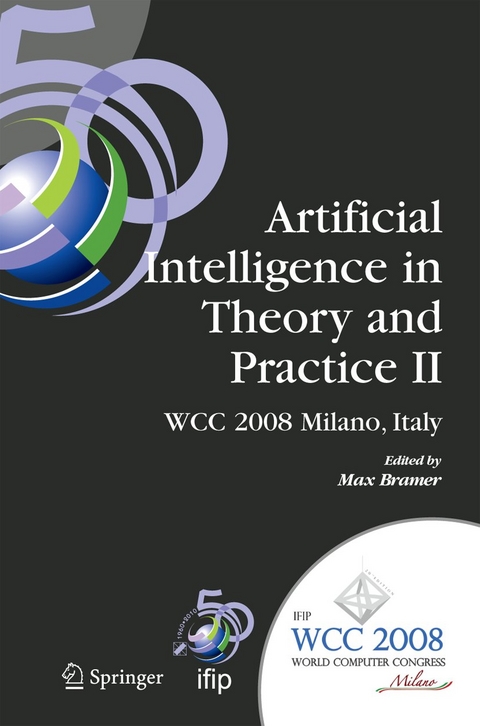
Artificial Intelligence in Theory and Practice II
Springer-Verlag New York Inc.
978-1-4419-3518-2 (ISBN)
- Titel ist leider vergriffen;
keine Neuauflage - Artikel merken
Agents 1.- A Light-Weight Multi-Agent System Manages 802.11 Mesh Networks.- Decisions with multiple simultaneous goals and uncertain causal effects.- Agent Based Frequent Set Meta Mining: Introducing EMADS.- Agents 2.- On the evaluation of MAS development tools.- Information-Based Planning and Strategies.- Teaching Autonomous Agents to Move in a Believable Manner within Virtual Institutions.- Data Mining.- Mining Fuzzy Association Rules from Composite Items.- P-Prism: A Computationally Efficient Approach to Scaling up Classification Rule Induction.- Applying Data Mining to the Study of Joseki.- A Fuzzy Semi-Supervised Support Vector Machines Approach to Hypertext Categorization.- Neural Networks.- Estimation of Neural Network Parameters for Wheat Yield Prediction.- Enhancing RBF-DDA Algorithm’s Robustness: Neural Networks Applied to Prediction of Fault-Prone Software Modules.- Learning.- A Study with Class Imbalance and Random Sampling for a Decision Tree Learning System.- Answer Extraction for Definition Questions using Information Gain and Machine Learning.- Batch Reinforcement Learning for Controlling a Mobile Wheeled Pendulum Robot.- Knowledge Management.- Optimizing Relationships Information in Repertory Grids.- Modeling Stories in the Knowledge Management Context to Improve Learning Within Organizations.- Knowledge Modeling Framework for System Engineering Projects.- Foundations.- Machines with good sense: How can computers become capable of sensible reasoning?.- Making Use of Abstract Concepts–Systemic-Functional Linguistics and Ambient Intelligence.- Making Others Believe What They Want.- Foundation for Virtual Experiments to Evaluate Thermal Conductivity of Semi- and Super-Conducting Materials.- Applications 1.- Intelligent Systems Applied to Optimize Building’s Environments Performance.- A Comparative Analysis of One-class Structural Risk Minimization by Support Vector Machines and Nearest Neighbor Rule.- Estimation of the Particle Size Distribution of a Latex using a General Regression Neural Network.- Intelligent Advisory System for Designing Plastics Products.- Applications 2.- Modeling the Spread of Preventable Diseases: Social Culture and Epidemiology.- An Intelligent Decision Support System for the Prompt Diagnosis of Malaria and Typhoid Fever in the Malaria Belt of Africa.- Detecting Unusual Changes of Users Consumption.- Techniques.- Optimal Subset Selection for Classification through SAT Encodings.- Multi-objective Model Predictive Optimization using Computational Intelligence.- An Intelligent Method for Edge Detection based on Nonlinear Diffusion.- Semantic Web.- A Survey of Exploiting WordNet in Ontology Matching.- Using Competitive Learning between Symbolic Rules as a Knowledge Learning Method.- Knowledge Conceptualization and Software Agent based Approach for OWL Modeling Issues.- Representation, Reasoning and Search.- Context Search Enhanced by Readability Index.- Towards an Enhanced Vector Model to Encode Textual Relations: Experiments Retrieving Information.- Efficient Two-Phase Data Reasoning for Description Logics.- Some Issues in Personalization of Intelligent Systems: An Activity Theory Approach for Meta Ontology Development.- Short Papers.- Smart communications network management through a synthesis of distributed intelligence and information.- An Abductive Multi-Agent System for Medical Services Coordination.- A New Learning Algorithm for Neural Networks with Integer Weights and Quantized Non-linear Activation Functions.- Neural Recognition of Minerals.- Bayesian Networks Optimization Based on Induction Learning Techniques.- Application of Business Intelligence for Business Process Management.- Learning Life Cycle in Autonomous Intelligent Systems.- A Map-based Integration of Ontologies into an Object-Oriented Programming Language.
| Erscheint lt. Verlag | 23.11.2010 |
|---|---|
| Reihe/Serie | IFIP International Federation for Information Processing ; 276 |
| Zusatzinfo | XVIII, 462 p. |
| Verlagsort | New York, NY |
| Sprache | englisch |
| Maße | 155 x 235 mm |
| Gewicht | 730 g |
| Themenwelt | Geschichte ► Teilgebiete der Geschichte ► Technikgeschichte |
| Informatik ► Theorie / Studium ► Künstliche Intelligenz / Robotik | |
| Naturwissenschaften ► Physik / Astronomie ► Optik | |
| ISBN-10 | 1-4419-3518-5 / 1441935185 |
| ISBN-13 | 978-1-4419-3518-2 / 9781441935182 |
| Zustand | Neuware |
| Haben Sie eine Frage zum Produkt? |
aus dem Bereich


